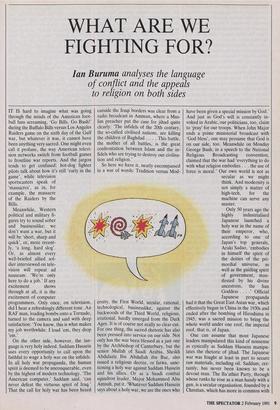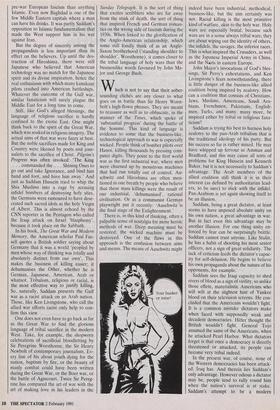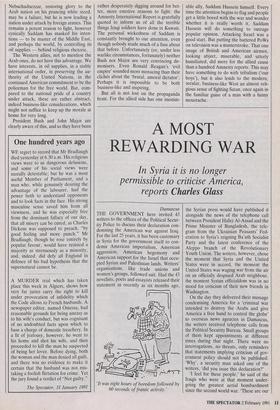WHAT ARE WE FIGHTING FOR?
Ian Buruma analyses the language
of conflict and the appeals to religion on both sides
IT IS hard to imagine what was going through the minds of the American foot- ball fans screaming, `Go Bills, Go Bush!' during the Buffalo Bills versus Los Angeles Raiders game on the sixth day of the Gulf war, but whatever it was, it cannot have been anything very sacred. One might even call it profane, the way American televi- sion networks switch from football games to frontline war reports. And the jargon tends to get confused: hot-dog fighter pilots talk about how it's still 'early in the game', while television sportscasters speak of `massacres', as in, for example, the massacre of the Raiders by the Bills.
Meanwhile, Western political and military fi- gures try to sound sober and businesslike: we don't want a war, but it will be 'short, sharp and quick', or, more recent- ly, 'a long, hard slog'. Or, as almost every well-briefed allied sol- dier interviewed on tele- vision will repeat ad nauseam: 'We're only here to do a job.' If any excitement shows through at all, it is the excitement of computer programmers. Only once, on television, did I bear a refreshingly different tone. An RAF man, loading bombs onto a Tornado, turned to the camera and said with deep satisfaction: 'You know, this is what makes my job worthwhile: I load 'em, they drop 'em.'
On the other side, however, the lan- guage is very holy indeed. Saddam Hussein uses every opportunity to call upon the faithful to wage a holy war on the infidels. In all holy war propaganda, the human spirit is deemed to be unconquerable, even by the highest of modern technology. `The American computer,' Saddam said, 'can never defeat the virtuous spirit of Iraq.' That the call for holy war has been heard outside the Iraqi borders was clear from a radio broadcast in Amman, where a Mus- lim preacher put the case for jihad quite clearly: 'The infidels of the 20th century, the so-called civilised nations, are killing the children of Baghdad . . . . This battle, the mother of all battles, is the great confrontation between Islam and the in- fidels who are trying to destroy our civilisa- tion and religion.'
So here we have it, neatly encompassed in a war of words: Tradition versus Mod- entity, the First World, secular, rational, technological, businesslike, against the backwoods of the Third World, religious, irrational, hardly emerged from the Dark Ages. It is of course not really so clear-cut. For one thing, the sacred rhetoric has also been pressed into service on our side. Not only has the war been blessed as a just one by the Archbishop of Canterbury, but the senior Mullah of Saudi Arabia, Sheikh Abdulaziz Ibn Abdullah ibn Baz, also issued a religious decree, or fatwa, sanc- tioning a holy war against Saddam Hussein and his allies. Or as a Saudi combat squadron leader, Major Mohammed Abu Amnah, put it, 'Whatever Saddam Hussein says about a holy war, we are the ones who have been given a special mission by God.' And just as God's will is constantly in- voked in Arabic, our politicians, too, claim to 'pray' for our troops. When John Major ends a prime ministerial broadcast with `God bless', one may presume that God is on our side, too. Meanwhile on Monday George Bush, in a speech to the National Religious Broadcasting convention, claimed that the war had 'everything to do with what religion embodies . . . the use of force is moral.' Our own world is not as secular as we might think. And modernity is not simply a matter of high-tech, for the machine can serve any master.
Only 50 years ago the highly industrialised Japanese launched a holy war in the name of their emperor, who, according to one of Japan's top generals, Araki Sadao, 'embodies in himself the spirit of the deities of the pri- mordial universe, as well as the guiding spirit of government, man- ifested by his divine ancestress, the Sun Goddess . . . .' Official Japanese propaganda had it that the Great East Asian war, which effectively began in China in the 1930s and ended after the bombing of Hiroshima in 1945, was a sacred mission to bring the whole world under one roof, the imperial roof, that is, of Japan.
One can assume that most Japanese leaders manipulated this kind of nonsense as cynically as Saddam Hussein manipu- lates the rhetoric of jihad. The Japanese war was fought at least in part to secure raw materials, including oil. Saddam, cer- tainly, has never been known to be a devout man. The Ba'athist Party, through whose ranks he rose as a man handy with a gun, is a secular organisation, founded by a Christian, which has more in common with pre-war European fascism than anything Islamic. Even now Baghdad is one of the few Middle Eastern capitals where a man can have his drinks. It was partly Saddam's opposition to Islamic fundamentalism that made the West support him in his war against Iran.
But the degree of sincerity among the propagandists is less important than its effect on the believers. Up until the des- truction of Hiroshima, there were still Japanese who believed that American technology was no match for the Japanese spirit and its divine inspiration, hence the real enthusiasm with which many kamikaze pilots crashed into American battleships. Whatever the outcome of the Gulf war, similar fanaticism will surely plague the Middle East for a long time to come.
Still, like God's alleged blessings, the language of religious sacrifice is hardly confined to the exotic East. One might think back to the spirit of the Great War, which was soaked in religious imagery. The actual aims of that war were fuzzy at best. But the noble sacrifices made for King and Country were likened by poets and jour- nalists to the sacrifice of Christ. Pilgrim's Progress was often invoked: 'The King . . . commanded the . . . Shining Ones to go out and take Ignorance, and bind him hand and foot, and have him away.' And just as Saddam Hussein tried to whip the Shia Muslims into a rage by accusing infidel bombers of destroying holy sites, the Germans were rumoured to have dese- crated such sacred idols as the holy Virgin of Albert. This is almost echoed by the CNN reporter in the Pentagon who called the Iraqi attack on Israel 'blasphemy', because it took place on the Sabbath.
In his book, The Great War and Modern Memory, the American scholar Paul Fus- sell quotes a British soldier saying about Germany that it was a world 'peopled by men whose way of thinking was totally and absolutely distinct from our own'. This makes the business of killing easier; it dehumanises the Other, whether he is German, Japanese, American, Arab or whatnot. Tribalism, religious or racial, is the most effective way to justify killing, So, naturally, Saddam presents the Gulf war as a racist attack on an Arab nation. Those, like Ken Livingstone, who call the allied war efforts racist only help to con- firm this view.
One does not even have to go back as far as the Great War to find the glorious language of tribal sacrifice in the modern West. Take, for example, the shopworn celebrations of sacrificial bloodletting by Sir Peregrine Worsthorne, the Sir Henry Newbolt of contemporary journalism. Ev- ery line of his about youth dying for the nation, baptism by fire, or the beauty of manly combat could have been written during the Great War, or the Boer war, or the battle of Agincourt. Twice Sir Pereg- rine has compared the art of war with the art of making love in his leaders in the
Sunday Telegraph. It is the sort of thing that excites scribblers who are far away from the stink of death, the sort of thing that inspired French and German roman- tics on the wrong side of fascism during the 1930s. When linked to the glorification of the Anglo-American relationship, which some still fondly think of as an Anglo- Saxon brotherhood (`standing shoulder to shoulder', Worsthorne), it comes closer to the tribal language of holy wars than the businesslike words favoured by John Ma- jor and George Bush.
Which is not to say that their sober- sounding clichés are any closer to what goes on in battle than Sir Henry Worst- bolt's high-flown phrases. They are meant to reassure as well as to obfuscate, in the manner of the Times, which spoke of `substantial progress' during the battle of the Somme. This kind of language is evidence to some that the business-like, technological approach to war is especially wicked. People think of bomber pilots over Hanoi, killing thousands by pressing com- puter digits. They point to the first world war as the first industrial war, where men were churned up by monstrous machines that had run totally out of control. Au- schwitz and Hiroshima are often men- tioned in one breath by people who believe that these mass killings were the result of our industrial, 'dehumanised', rational civilisation. Or as a communist German playwright put it recently: 'Auschwitz is the final stage of the Enlightenment.'
There is, in this kind of thinking, often a palpable sense of nostalgia for more heroic methods of war. Deep meaning must be restored; the wicked machine must be destroyed. One of the flaws in this approach is the confusion between aims and means. The means of Auschwitz might indeed have been industrial, methodical, business-like, but the aim certainly was not. Racial killing is the most primitive kind of warfare, akin to the holy war. Holy wars are especially brutal, because such wars are in a sense always tribal wars; they are about wiping out the identity of others, the infidels, the savages, the inferior races. This is what inspired the Crusaders, as well as the Japanese Imperial Army in China, and the Nazis in eastern Europe.
John Major's invocations of God's bles- sings, Sir Perry's exhortations, and Ken Livingstone's fears notwithstanding, there is little danger of the business-like allied coalition being inspired by zealotry. How can a coalition that consists of Christians, Jews, Muslims, Americans, Saudi Ara- bians, Frenchmen, Pakistanis, English- men, Turks, and many, many more, be inspired either by tribal or religious fana- ticism?
Saddam is trying his best to harness holy zealotry to the pan-Arab tribalism that is the traditional ideology of his party. But his success so far is rather mixed. He may have whipped up fervour in Amman and Bradford, and this may cause all sorts of problems for King Hussein and Kenneth Baker, but it is not necessarily to Saddam's advantage. The Arab members of the allied coalition still think it is in their interest (as defined by authoritarian lead- ers, to be sure) to stick with the infidel. Pan-Arabism is yet again showing itself to be an illusion.
Saddam, being a great dictator, at least seems to have imposed absolute unity on his own nation, a great advantage in war. But in fact even this advantage may be another illusion. For one thing unity en- forced by fear can be surprisingly brittle. Saddam cannot trust anyone. Like Stalin, he has a habit of shooting his most senior officers, not a sign of great solidarity. The lack of criticism feeds the dictator's capac- ity for self-delusion. He begins to believe his own propaganda about the nature of his opponents, for example.
Saddam sees the Iraqi capacity to shed rivers of blood as a sign of virility, so unlike those effete, materialistic Americans who will wilt at the slightest hint of Yankee blood on their television screens. He con- cluded that the Americans wouldn't fight. It is a common mistake dictators make when faced with supposedly weak and decadent democracies. Hitler thought the British wouldn't fight. General Tojo assumed the same of the Americans, when he attacked Pearl Harbor. What dictators forget is that once a democracy is directly threatened or attacked, its people can become very tribal indeed.
In the present war, of course, none of the Western democracies has been attack- ed. Iraq has. And therein lies Saddam's only advantage. However odious a dictator may be, people tend to rally round him when the nation's survival is at stake. Saddam's attempt to be a modern Nebuchadnezzar, restoring glory to the Arab nation on his prancing white steed, may be a failure, but he is now leading a nation under attack by foreign armies. This remains a potent reason to fight, however cynically Saddam has masked his inten- tions — to be master of the Middle East, and perhaps the world, by controlling its oil supplies — behind religious rhetoric.
The Western allies, not to mention the Arab ones, do not have this advantage. We have interests, in oil supplies, in a stable international order, in preserving the au- thority of the United Nations, in the continued American commitment to be the policeman for the free world. But, com- pared to the national pride of a country under attack, these are rather abstract, indeed business-like considerations, which might not suffice to keep up the morale at home for very long.
President Bush and John Major are clearly aware of this, and so they have been rather desperately digging around for bet- ter, more emotive reasons to fight: the Amnesty International Report is gratefully quoted to inform us of all the terrible things Iraqi soldiers have done in Kuwait. The personal wickedness of Saddam is constantly brought to our attention, even though nobody made much of a fuss about that before. Unfortunately (or, under less warlike circumstances, fortunately) neither Bush nor Major are very convincing de- monisers. Even Ronald Reagan's 'evil empire' sounded more menacing than their clichés about the 'brutal, amoral dictator'. Perhaps it is impossible to be both business-like and inspiring.
But all is not lost on the propaganda front. For the allied side has one inestim- able ally, Saddam Hussein himself. Every time the attention begins to flag and people get a little bored with the war and wonder whether it is really worth it, Saddam Hussein will do something to outrage popular opinion. Attacking Israel was a good start. But putting the battered PoWs on television was a masterstroke. That one image of British and American airmen, looking abject, miserable, and utterly humiliated, did more for the allied cause than a hundred Amnesty reports. This may have something to do with tribalism (`our boys'), but it also lends to the modern, secular, business-like West an almost reli- gious sense of fighting Satan, once again in the familiar guise of a man with a funny moustache.




















































 Previous page
Previous page